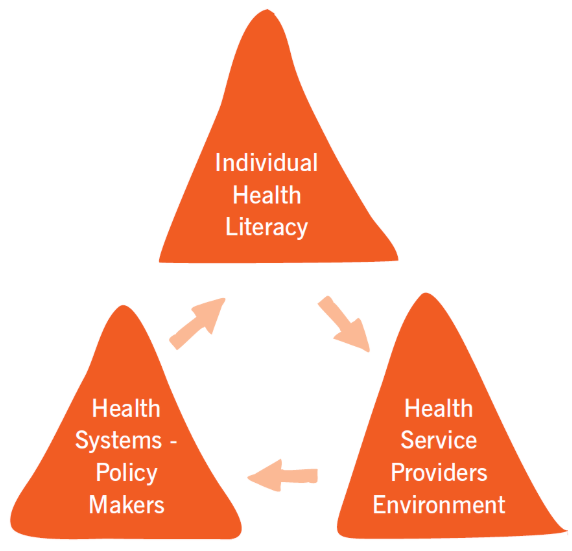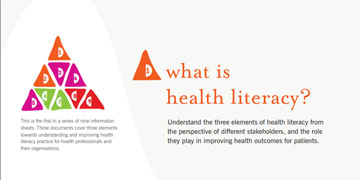How Can We Help?
Health literacy is essential for maintaining good health and improving the quality of life. Conversely there is extensive evidence linking low health literacy to poor health outcomes.
Health literacy is a concept that has been defined, measured and understood in many ways. On one hand health literacy looks at whether patients can obtain, process and understand the health information and services they need to make their health decisions. On the other, it looks at how healthcare providers and systems can provide information and improve interaction with individuals, communities and each other to improve health literacy(1).
Individual health professionals play an important role in influencing individual health literacy through their client interactions. It is essential that health service providers support these efforts by making services more accessible and interactive to achieve improved health outcomes for communities.
Health literacy stakeholders
Individual health literacy
Early definitions of health literacy focused on the individual knowledge and skills needed to successfully navigate the health system. This understanding of health literacy includes looking at literacy and numeracy skills of individuals, as well as capabilities to find, understand, interpret and communicate information, so patients can access and use
health services, and make appropriate decisions to manage their own health(2).
Individual health literacy is related to that person’s social determinants of health. As a health service professional you can have an influence in improving a patient’s individual health literacy level. However having an understanding of health literacy levels within a community or population can be helpful in planning effective communication strategies and interventions.
Health provider (health professionals and services) environment
Increasingly the concept of health literacy is looked at as an interactive process between individuals, communities, healthcare professionals, organisations and systems.
Health providers – both individual professionals and health services as a whole – have a central role to play in this process, as they can influence the health literacy environment within a service setting. Individual health professionals have direct interaction with clients and how they communicate and provide information to those individuals directly can influence their knowledge, interaction and decision making capabilities.
The complexity of health systems mean that health services play a major role in developing processes that make their services more accessible to individuals. They can do this by:
- influencing how their services are structured
- ensuring health professionals within their service provide information effectively
- prioritising client interactions so they can make sense of, and act upon, the information.
(See the Supportive systems for Health Literacy info sheet)
This can make the health service easier to navigate and more effective, contributing to better patient outcomes. Some methods of achieving this are included in the Health Literacy Info Sheet series.
Health systems environment- policy makers
Health literacy deals with the complexity of both health information that is presented to consumers as well as how well the health system itself can be navigated. Policy makers are key to establishing health literacy within this environment for individual consumers. Increasingly, strategic efforts are being made to improve both the systems environment for health care organisations to enable them to implement health literacy processes and practices, but also of health systems overall at a national level. Accordingly, there has been an increase in key international and national health policies.
Health literacy is a key determinant in the health outcomes of individuals and communities as a whole, therefore it is important for Governments to develop an understanding of health literacy as it relates to other social determinants of health and overall health outcomes. See the ‘Social determinants of health and health literacy’ info sheet.

References:
1. Department of Health, Victorian Government, Health Literacy Background paper, 2013
2. Health Literacy Framework from Parker, R. Measuring Health literacy: what? So what? Now what?
In Hernandez L, ed. Measures of health literacy: workshop summary, Roundtable on Health Literacy. Washington, DC, National Academies Press, 2009: 91-98.
English Resource:
Last reviewed: Dec 2015
Resource Type: Tip/Fact Sheets

